RTE Kayak Guides Participate in Local and Statewide Events to Advocate for the Everglades
ON A MISSION:
Rising Tide Explorers Guides go beyond the estuary to advocate for SWFL environments.
Florida Gulf Coast University graduate students Celina Ceballos and Susannah Cogburn recently took their science expertise one step further by participating in the Everglades Coalition Conference and Everglades Action Day.
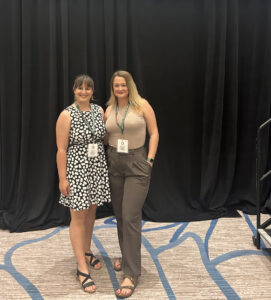
Celina and Susannah joined Rising Tide Explorers in November of 2023 as kayak guides, each with their own unique passion and experiences. Getting their master’s degrees in environmental science, they are big advocates for Florida’s ecosystems, studying the impacts of natural red tide toxins on sea turtles and manatees and unnatural human-created toxins on bull sharks.
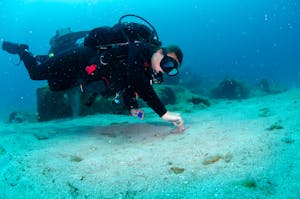
Susannah Cogburn
Cogburn knew at an early age she wanted to pursue a career in Marine Science and is currently working towards her graduate degree from Florida Gulf Coast University (FGCU) in Environmental Science. As an undergraduate student, Susannah began volunteering at Rookery Bay and has continued volunteering there for the past five years. This volunteer experience has led her to her graduate research.
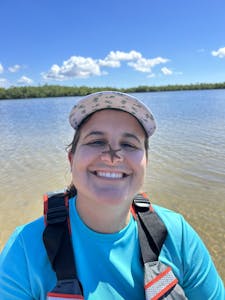
Celina Ceballos
Ceballos developed her science curiosity working with terrapins for many summers at the Wetlands Institute at the Jersey Shore. More recently Celina spent time studying sea turtle nesting and rehabilitation at the Loggerhead Marinelife Center in Juno Beach and the Georgia Sea Turtle Center in Jekyll Island, Georgia. With a minor in journalism and experience as an interpreter, she is also driven to bridge the gap between science and the public through effective communication and inspiration. You can learn much more about these Southwest Florida heroes in the ABOUT US page or by joining them on an amazing guided kayak tour!
Local Action: Everglades Coalition Conference
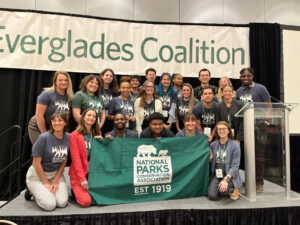
National Parks Conservation Association Everglades Coalition Conference Scholarship Recipients featuring kayak guides Celina Ceballos and Susannah Cogburn
In Bonita Springs, the Everglades Coalition Conference was a weekend event from January 25-27, 2024 at the Hyatt Regency Coconut Point Resort and Spa, connecting Florida’s policymakers, stakeholders, NGOs, Native American Tribes, and everglades residents together to discuss important issues related to this national park’s protection. Ceballos and Cogburn were awarded the National Parks Conservation Association Conference Scholarship, a full scholarship to attend the conference among about two-dozen students from many Florida universities, chosen from over 100 applications. Ceballos and Cogburn wanted to share their experiences from this event as attendees because they were inspired to see all the collaboration and teamwork amongst diverse groups of people to protect the everglades. As a non-academic conference, many interesting groups of people presented on panel sessions about progress and priorities in everglades conservation.
The theme of the conference was “Restoration Rewards: benefiting Ecosystems, Economies, and Communities,” and Ceballos and Cogburn saw so much evidence of the payoffs of restoration during the conference session. From seeing adorable and inspiring hatchling roseate spoonbills thriving in the southern everglades, hearing about resilient corals that survived the summer heat wave in the Florida Keys, and finding out about the impacts of policies that have created designated protected areas of the everglades, Ceballos and Cogburn were pleased to see a lot of progress in terms of restoration, but they understand that more work is needed.
The Everglades Coalition itself is an alliance of 57 local, state, and national conservation and environmental organizations that unite together federal, state, local, tribal, NGO, and academic people to work toward everglades restoration. Everglades activist Diamond Bergeron of Bergeron Everglades Foundation set the stage well in her opening speech.
“[For effective restoration, we must] not build walls but a bigger table,” Bergeron said.
Just as animals do not know borders, neither can we. The emphasis on inclusion and partnership in conservation was seen throughout the conference.
The most interesting panels in the eyes of Ceballos and Cogburn were “Clean H2O: A Formula for Ecological Health and Economic Success,” “A Tale of Two Bays: Restoring Biscayne Bay and Florida Bay,” “A View from the Reef: Marine Ecosystem Connectivity,” and “Art, Culture, and the Everglades.”
Clean water is essential for all communities, but this is especially an issue in our local southwest Florida communities. Recently, the Sanibel-Captiva Conservation Foundation, Conservancy of Southwest Florida, Captains for Clean Water, and Greene Economics put together a report to determine the impacts of water quality on the southwest Florida economy, and they presented the results of this report at the clean water session. Their main finding was that the next harmful algal bloom would have a $5.2 billion impact on the coastal economies of Charlotte, Lee, and Collier Counties.
The main theme of the clean water session was “perfect is not the enemy of good,” in that of course we can strive for perfectly clean water, but we must also just do our best to make water quality better than the current state. Since it is proven that harmful algal blooms like red tide are exasperated by actions on land, particularly discharges from Lake Okeechobee, we must do our best to work together to limit these detrimental actions.
Panelists cited the beneficial work that will be completed through the Comprehensive Everglades Restoration Plan (CERP), along with specifically the Western Everglades Restoration Plan (WERP) for southwest Florida. They hope that the creation of the Everglades Agricultural Area Reservoir Project will also aid in the process of cleaning up southwest Florida’s water.
During the panel about restoring Florida Bay and Biscayne Bay, although these estuaries are on the east coast of Florida, Ceballos and Cogburn found similar themes discussed as what they themselves tell guests during their kayak tours, especially about mangroves. Mangroves are essential to the well-being of southwest Florida as a carbon capturing ecosystem, a nursery for wildlife, and a zone of protection.
“Mangroves are magic,” Irela Bague, chair of Miami-Dade County’s Biscayne Bay Task Force, said.
The nature-based buffer that mangroves provide has been proven to allow communities behind mangrove forests to recover quicker after strong storms, according to Drew Bartlett of the South Florida Water Management District. Ceballos and Cogburn are grateful to be able to paddle through such an amazing ecosystem through their work with Rising Tide Explorers.
As marine scientists, Ceballos and Cogburn were particularly excited about the panel about coral reefs. As the name of the panel implies, while coral reefs are not technically part of the everglades, all ecosystems are connected, especially within the coastal and marine realm. After the devastating 2023 summer marine heatwave, which received a lot of attention in news-media outlets, Ceballos and Cogburn were pleased to hear an update about the response and recovery of the Florida Keys reefs.
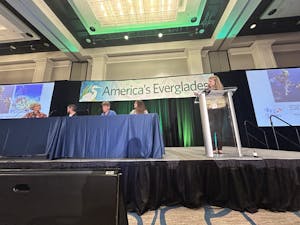
Pictured: panelists from “A View from the Reef: Marine Ecosystem Connectivity” session
The heatwave last summer was unique and unprecedented in that the hot summer temperatures started early, and the degree heating week (DHW), which measures temperature stress of corals through time, was significantly higher than historic data.
“Unlike something we’ve ever seen,” Sarah Fangman of the Florida Keys National Marine Sanctuary said.
Unfortunately, the coral reef survey sites say a loss of 95-100% of Acroporas, which are a specific type of coral that includes staghorn and elkhorn corals, the strong reef-building backbone corals of the reef. However, they did see resilient corals in brain, boulder, and star corals, which were able to survive through the heat wave. While it was devastating to hear about the tremendous loss in the coral reefs last summer, it was encouraging to hear that some of the restoration methods, like moving the corals to deeper water and rescuing them to controlled temperature tanks, proved to be successful.
Fangman also used this inspirational quote to describe what it is like working in coral restoration: “Visionaries are people who plant trees knowing full well they will never live to rest in their shade.”
After attending numerous sessions that were quite heavy on science and policy, Ceballos and Cogburn were thrilled to attend a unique session on the connections between art, culture, and the everglades. Just like the peace that guests can witness and appreciate during a kayak tour through Rookery Bay, the everglades offer a similar experience through its extensive remote and special ecosystems.
“Artists enrich the chorus of support for everglades restoration,” photographer Lisette Morales said.
The beauty and mystery of the everglades is such an essential part of Florida’s culture, especially for the Miccosukee and Seminole Tribes. The amazing photographs and art that the panelists shared was breathtaking and encouraged Ceballos and Cogburn to want to take a trip to the everglades as soon as possible.
Overall, the Everglades Coalition Conference was an astounding weekend of learning, networking, and collaboration that Ceballos and Cogburn were honored to partake in. In fact, Ceballos and Cogburn were so inspired that they decided to sign up for Everglades Action Day, and on February 7 joined over two dozen conference attendees on a bus all the way to Tallahassee to advocate for and defend everglades restoration.
Tallahassee Bound: Everglades Action Day

Pictured left to right Daniel Lewis, Celina Ceballos, Michele Arquette-Palermo, Susannah Cogburn, and Allie Pecenka in the Florida Capitol for Everglades Action Day
Ceballos and Cogburn joined a strong team of women including Sanibel Captiva Conservation Foundation Policy and Advocacy Associate Allie Pecenka and Conservancy of Southwest Florida Michele Arquette-Palermo. They met with three representatives, Adam Botana, Mike Giallombardo, and the staff of Tiffany Esposito, presenting the main priorities of the Everglades Coalition to bring to their attention.
Ceballos and Cogburn learned that Governor Ron DeSantis has proposed $745 million in Everglades restoration funding, which is nearly matched by the House of Representatives at $725 million. Also, a bill called Everglades Protection Area Bill (HB 723/SB 1364) which adds a two-mile radius buffer zone around the everglades protection area that must be reviewed by the Florida Department of Environmental Protection for development. Ceballos and Cogburn explained and encouraged these two main policies to these representatives.
These explorers were pleasantly surprised at how easy, fun, and interesting it is to get involved in environmental policy, and Ceballos and Cogburn encourage you to do the same. Contacting your local representative about environmental policies you are passionate about is simple and quick. You can find your local representative here, or your local senator here, and all of their contact information is available for you to reach out to them. They are very receptive to constituent feedback and conversation, especially students!
Ceballos and Cogburn thoroughly enjoyed dipping their toes in everglades restoration, conservation, and policy by attending the Everglades Coalition Conference and Everglades Action Day. They are now implementing what they have learned into their tours. Enjoy any one of the kayak tours with Celina or Susannah to hear more about their experience or hit the water with another biologist guide from the team. As the exclusive ecotour partners for the Friends on Rookery Bay, proceeds from these kayak tours, boat tours, and rentals help to support local science and education.
